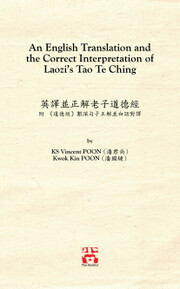Tao Te Ching
道德經
Background information
Tao Te Ching (《道德經》, or Dao De Jing), presumably written by Laozi (老子) of the 6th century BC, is one of the most famous and influential philosophical works in Chinese history. Written in fewer than 6000 Chinese characters, Tao Te Ching outlines the characteristics and roles of the fundamental Tao (道) and its Te (德, Manifestation of Tao) in the formation and maintenance of all in the Universe. Remarkably, it also depicts the underlying nature of governance and some natural laws, which, surprisingly, include modern scientific concepts such as atomic theory, chemical equilibrium, polarities, and the quantum uncertainty principle.
Unfortunately, Tao Te Ching is often misinterpreted by many for more than two thousand years. Their failures are mainly attributed to applying Taoist Religion (道教), Huang-Lao (黄老), and Confucian concepts in interpreting characters such as “鬼”, “神”, “仁”, “慈”, “善”, and “德”. Further, “若”, “似”, and “或” are also frequently misinterpreted, giving rise to the incorrect impression that Laozi was a scheming and calculating philosopher. Prominent interpreters of the past and present, including Heshang Gong (河上公), Wang Bi (王弼), Gao Heng (高亨), and James Legge, have all committed these types of errors in varying degrees.
This book provides readers with an annotated, line-by-line, concise, consistent, and correct English translation and interpretation of Tao Te Ching. Accompanied 674 footnotes include references and brief discussions on general misunderstandings. Further, to facilitate easy reading, the bare translated text is supplemented in a separate section, while the correct interpretation of difficult and complex sentences in vernacular Chinese (《道德經》艱深句子正解並白話對譯) in another. Accordingly, this book is perfect for anyone interested in Chinese philosophy.
Original Chinese Text
(Wang Bi's 王弼 Edition)
English Interpretation
by KS Vincent Poon (潘君尚) and Kwok Kin Poon (潘國鍵)
第二十三章 Chapter 23
____
69. 希言自然。故飄風不終朝, 驟雨不終日。孰為此者? 天地。天地尚不能久, 而況於人乎!
Words that cannot be heard (希言) are a fundamental nature (自然) of the Manifestation of Tao. Therefore, sounds from violent winds (飄風) do not last for a whole morning
(朝), and noises from sudden torrential rains (驟雨) do not last for an entire day. What directs all these? The Universe. Even the Universe cannot make its own act last forever, let alone (況於) mere humans!
70. 故從事於道者: 道者同於道; 德者同於德; 失者同於失。
Hence, from the point of those who follow and serve (從事) under Tao: those with Tao shall act the same way (同) as Tao; those with the Manifestation of Tao shall act the same way as the Manifestation of Tao; those who fail (失) both shall act the same way as failing both.
71. 同於道者, 道亦樂得之; 同於德者, 德亦樂得之; 同於失者, 失亦樂得之。信不足? 焉有不信焉!
Those who act the same way as Tao shall have Tao happily embracing (樂得) them; those who act the same way as the Manifestation of Tao shall have the Manifestation of Tao happily embracing them; those who act the same way as failing both shall have the way that fails both happily embracing them. Are the words above not enough to be credible? How can they not be credible!
****
第二十四章 Chapter 24
72. 企者不立;跨者不行;自見者不明;自是者不彰;自伐者無功;自矜者不長。
73. 其在道也,曰:餘食贅行。物或惡之,故有道者不處。
第二十五章 Chapter 25
74. 有物混成,先天地生。寂兮寥兮,獨立不改,周行而不殆,可以為天下母。
75. 吾不知其名,字之曰道,強為之名曰大。大曰逝,逝曰遠,遠曰反。故道大,天大,地大,王亦大。
76. 域中有四大,而王居其一焉。人法地,地法天,天法道,道法自然。
第二十六章 Chapter 26
77. 重為輕根,靜為躁君。是以聖人終日行不離輜重。 雖有榮觀,燕處超然。
78. 奈何萬乘之主,而以身輕天下?輕則失本,躁則失君。
第二十七章 Chapter 27
79. 善行無轍迹,善言無瑕讁;善數不用籌策;善閉無關楗而不可開,善結無繩約而不可解。
80. 是以聖人常善救人,故無棄人;常善救物,故無棄物。是謂襲明。
81. 故善人者,不善人之師;不善人者,善人之資。
82. 不貴其師,不愛其資,雖智大迷,是謂要妙。
第二十八章 Chapter 28
83. 知其雄,守其雌,為天下谿。為天下谿,常德不離,復歸於嬰兒。知其白,守其黑,為天下式。
84. 為天下式,常德不忒,復歸於無極。知其榮,守其辱,為天下谷。為天下谷,常德乃足,復歸於樸。
85. 樸散則為器,聖人用之,則為官長,故大制不割。
第二十九章 Chapter 29
86. 將欲取天下而為之,吾見其不得已。天下神器,不可為也,為者敗之,執者失之。
87. 故物或行或隨;或歔或吹;或強或羸;或挫或隳。
88. 是以聖人去甚,去奢,去泰。
第三十章 Chapter 30
89. 以道佐人主者,不以兵強天下。其事好還。師之所處,荊棘生焉。大軍之後,必有凶年。
90. 善有果而已,不敢以取強。果而勿矜,果而勿伐,果而勿驕。果而不得已,果而勿強。
91. 物壯則老,是謂不道,不道早已。
第三十一章 Chapter 31
92. 夫佳兵者,不祥之器,物或惡之,故有道者不處。君子居則貴左,用兵則貴右。兵者不祥之器,非君子之器,不得已而用之,恬淡為上。
93. 勝而不美,而美之者,是樂殺人。夫樂殺人者,則不可以得志於天下矣。
94. 吉事尚左,凶事尚右。偏將軍居左,上將軍居右,言以喪禮處之。殺人之衆,以哀悲泣之,戰勝以喪禮處之。
第三十二章 Chapter 32
95. 道常無名樸,雖小,天下莫能臣也。侯王若能守之,萬物將自賓。天地相合,以降甘露,民莫之令而自均。
96. 始制有名,名亦既有,夫亦將知止,知止所以不殆。
97. 譬道之在天下,猶川谷之與江海。
第三十三章 Chapter 33
98. 知人者智,自知者明。勝人者有力,自勝者強。
99. 知足者富。強行者有志。不失其所者久。死而不亡者壽。
____
FOR FURTHER TRANSLATION, FOOTNOTES, AND ELABORATIONS
PLEASE SEE :

An English Translation and the Correct Interpretation of Laozi’s Tao Te Ching 英譯並正解老子道德經 附 《道德經》艱深句子正解並白話對譯
by KS Vincent POON and Kwok Kin POON (July. 2020)
ISBN 978-1-989485-15-6
Tao Te Ching (《道德經》, or Dao De Jing), presumably written by Laozi (老子) of the 6th century BC, is one of the most famous and influential philosophical works in Chinese history. Written in fewer than 6000 Chinese characters, Tao Te Ching outlines the characteristics and roles of the fundamental Tao (道) and its Te (德, Manifestation of Tao) in the formation and maintenance of all in the Universe. Remarkably, it also depicts the underlying nature of governance and some natural laws, which, surprisingly, include modern scientific concepts such as atomic theory, chemical equilibrium, polarities, and the quantum uncertainty principle.
Unfortunately, Tao Te Ching is often misinterpreted by many for more than two thousand years. Their failures are mainly attributed to applying Taoist Religion (道教), Huang-Lao (黄老), and Confucian concepts in interpreting characters such as “鬼”, “神”, “仁”, “慈”, “善”, and “德”. Further, “若”, “似”, and “或” are also frequently misinterpreted, giving rise to the incorrect impression that Laozi was a scheming and calculating philosopher. Prominent interpreters of the past and present, including Heshang Gong (河上公), Wang Bi (王弼), Gao Heng (高亨), and James Legge, have all committed these types of errors in varying degrees.
This book provides readers with an annotated, line-by-line, concise, consistent, and correct English translation and interpretation of Tao Te Ching. Accompanied 674 footnotes include references and brief discussions on general misunderstandings. Further, to facilitate easy reading, the bare translated text is supplemented in a separate section, while the correct interpretation of difficult and complex sentences in vernacular Chinese (《道德經》艱深句子正解並白話對譯) in another. Accordingly, this book is perfect for anyone interested in Chinese philosophy.
WorldCat/Library: [WorldCat] [U of Oxford] [U of Cambridge] [Harvard U] [Kyoto U] [National Taiwan U] [HKU] [CUHK]etc...
Jump to: Taoism
Jump to: Works in Standard Script